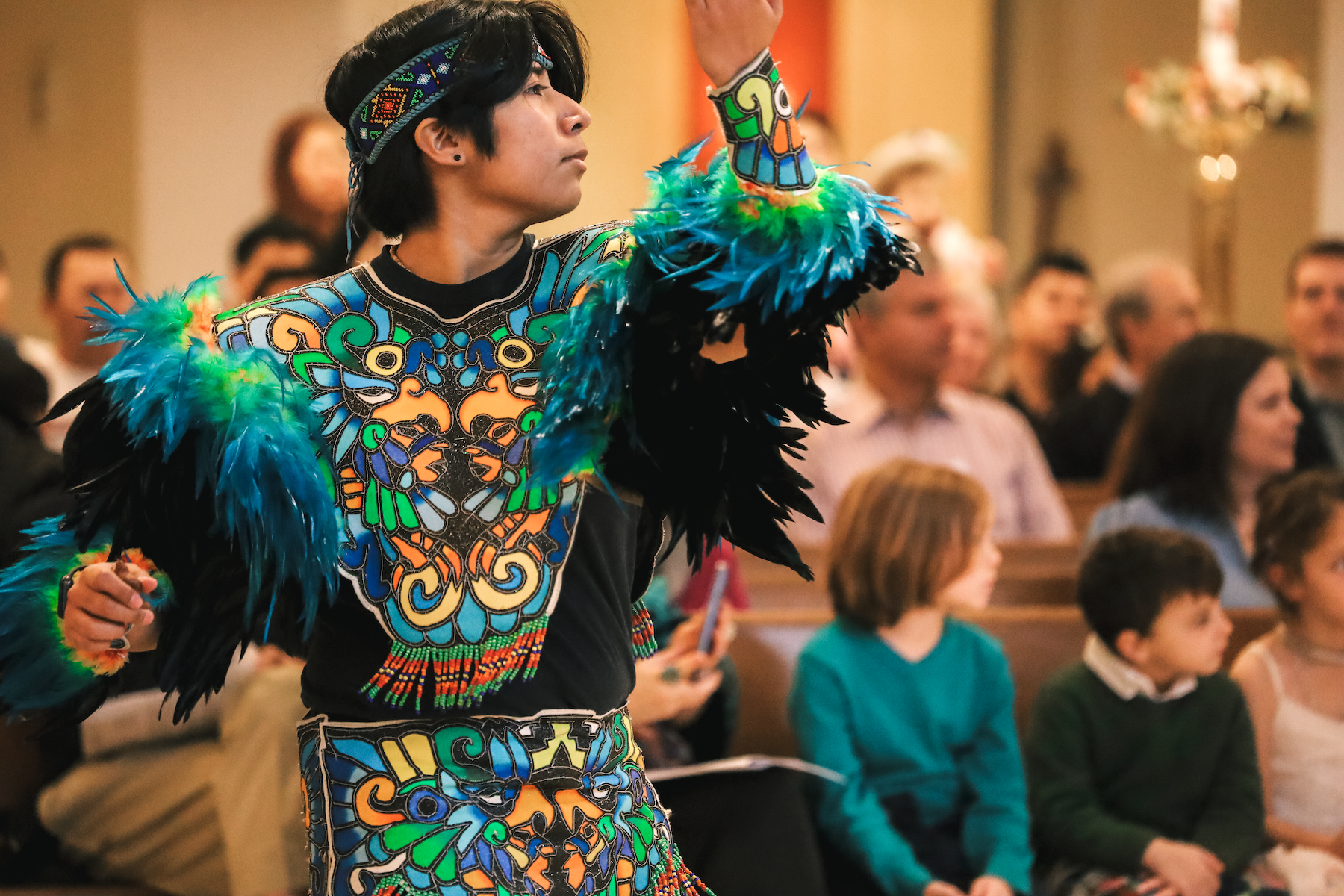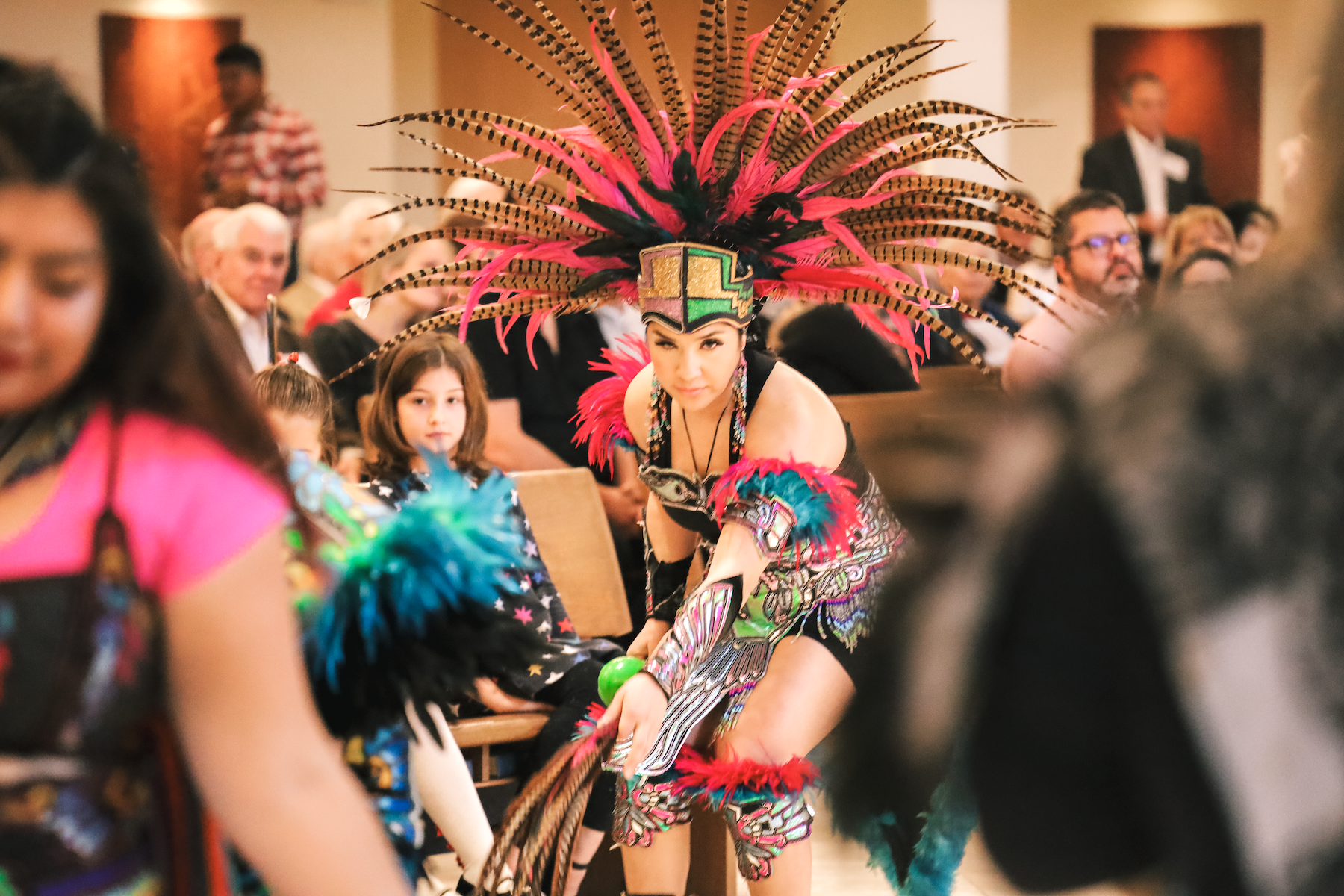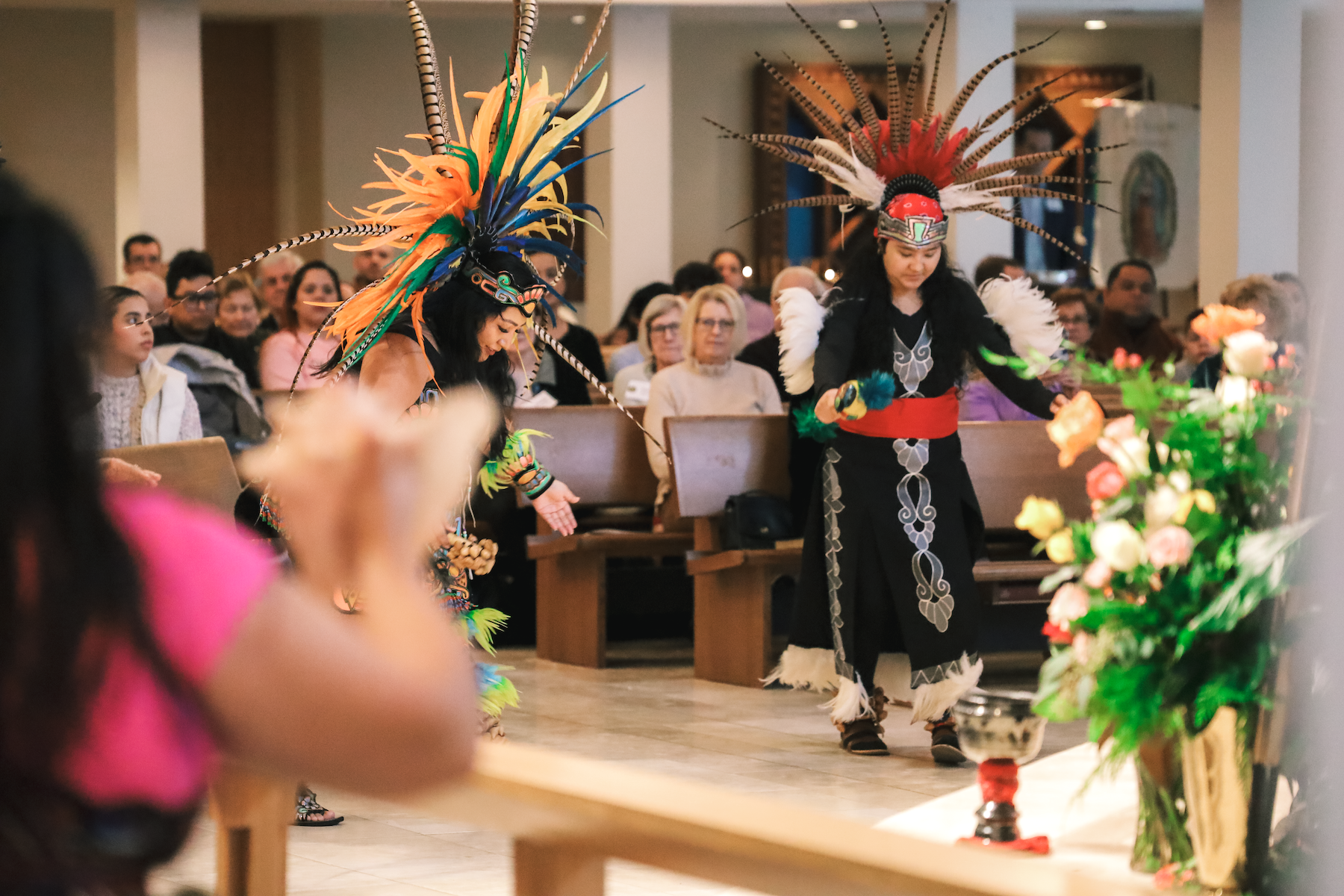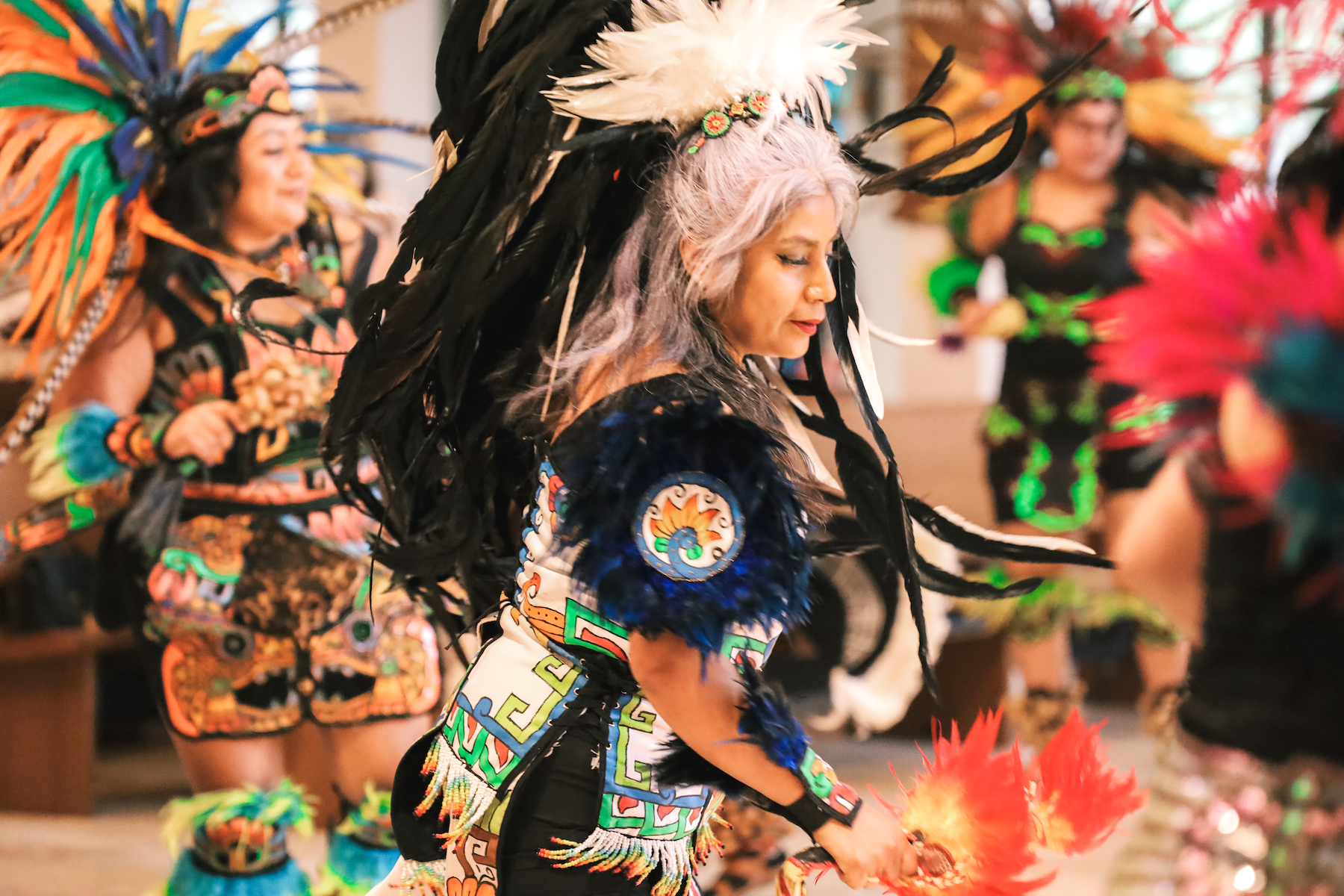Hispanic Ministries
Aztec dancers during a service at Holy Innocents’ Episcopal Church, 1 of 13 Hispanic missions
“Hoy estamos empezando algo nuevo, así como esta primera misa episcopal en español que se hace aquí. Y no sé 100% todas las razones que vinieron hoy, pero creo que es porque les conoce el buen pastor. Han escuchado su voz y lo ha seguido en sus vidas hasta aquí…” – The Rev. Andrew Gordon, sermon, San Pablo Macon, fourth Sunday of Easter, 2023
[English translation: “Today, we are starting something new, as this is the first Episcopal Mass in Spanish held here. And I don’t know 100% all the reasons that brought you here today, but I believe it’s because the good shepherd knows you. You have heard his voice and have followed him in your lives to this point.”]
 DOS MISIONES NUEVAS HISPANAS
DOS MISIONES NUEVAS HISPANAS
In 2050, 1 in 5 people in Metro Atlanta will speak Spanish, almost double the number from 2015, according to the Atlanta Regional Commission. In 2023, two Episcopal parishes just south of Atlanta reached out to their rising numbers of Hispanic neighbors with new services in Spanish, and the diocese now has 13 Spanish-speaking missions and ministries.
“I love the service in Spanish because that’s my main language, although I can also go to church where the service is in English, but I want to support my Hispanic community,” said Rosa Peña, who drives 25 miles from Peachtree City with her parents Jose and Rosura to attend new services at San Agustin in Morrow. “People should know that they can come as you are and they will be accepted as part of the family,” she said.
New opportunities are significant partly because US Census data show that Hispanic people in the United States are leaving the Catholic church and becoming religiously unaffiliated. Could more Hispanic people in Middle and North Georgia become interested in Episcopal services?
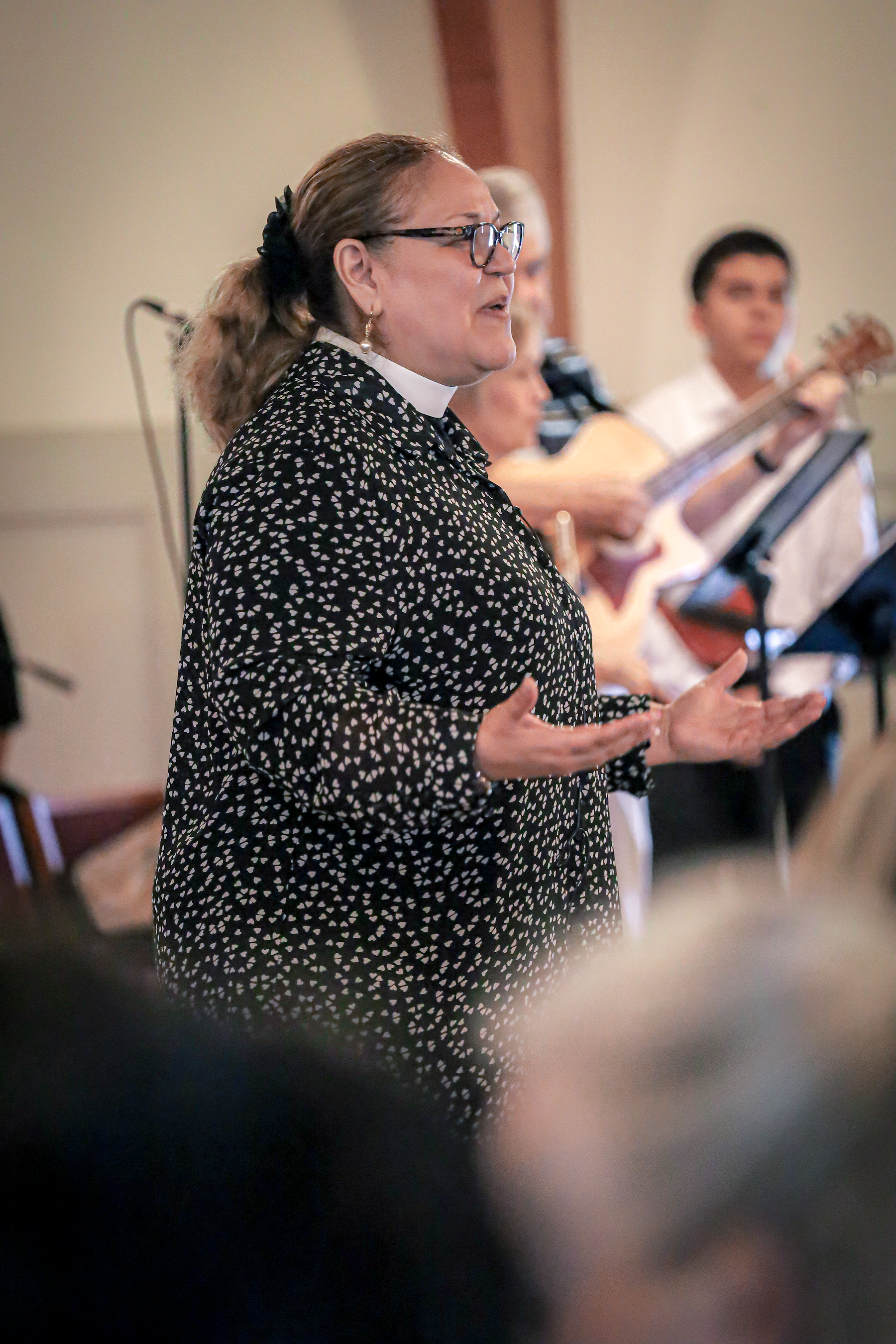
The Rev. Mimi Guerra welcomes people to a bilingual Imagine Worship service.
The worshippers and organizers of the new ministries—including San Pablo in Macon—see that already happening. The nuances of language, and the sense of belonging it inspires, profoundly influences their worship. So does the long- awaited El Libro de Oración Común, the Spanish translation of the Book of Common Prayer published in 2022. Speaking familiar words can nurture a continual offering of a sacrifice of praise, and multiply the opportunities to do good and to share with others. Just ask Hispanic Missioner Irma “Mimi” Guerra, who coordinates all Hispanic ministries in the diocese. A native of Mexico, Guerra moved to the United States in 1994 and was one of the first female Hispanic priests in the diocese.
“Someone needs to pinch me and say this is real,” she said. “It’s just like when you plant a seed and it’s growing, and every time you come to the worship service and see more people, that’s an inspiration to keep on doing it.”
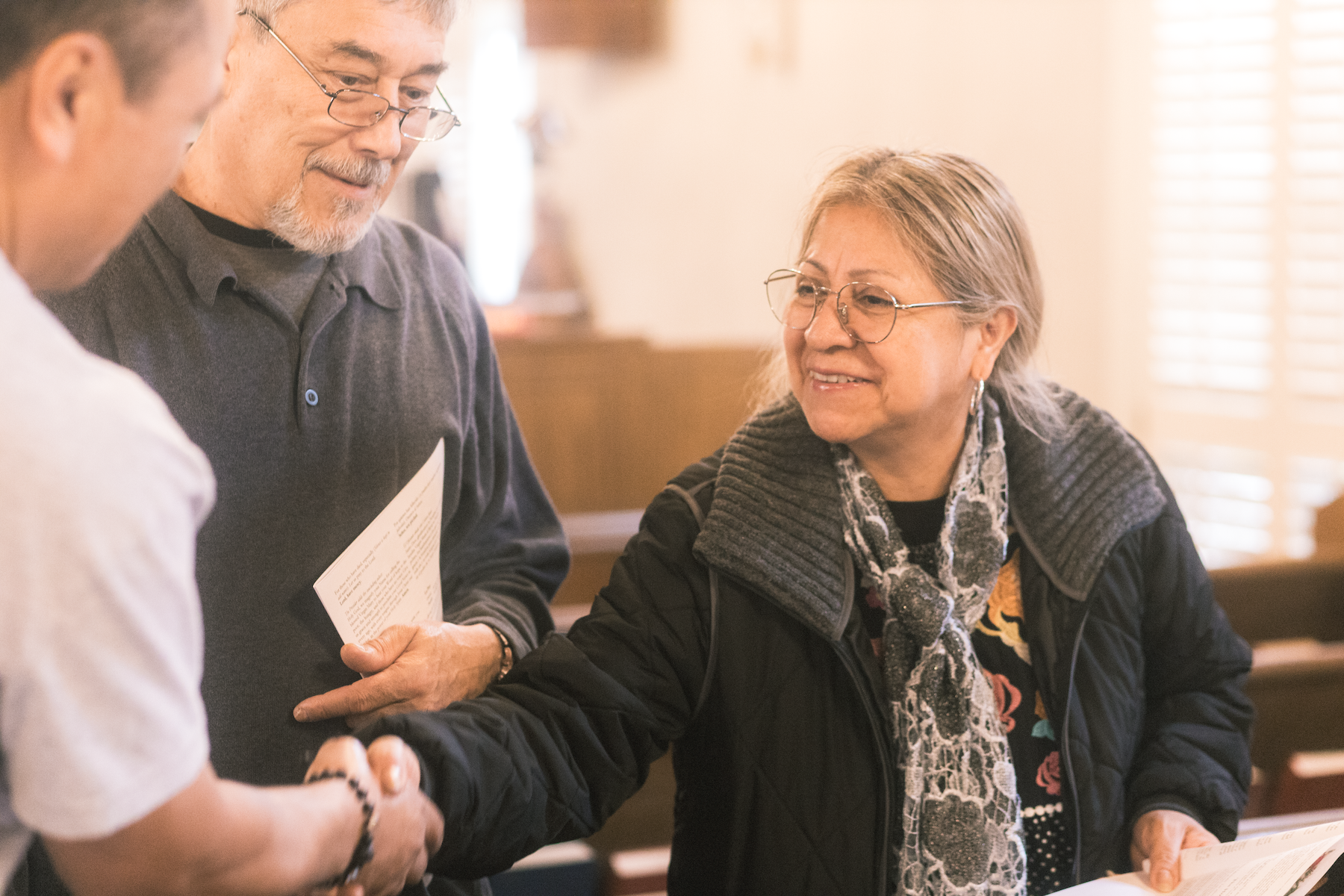
Parishioners at San Augustin welcome one another.
 SAN AGUSTIN, MORROW
SAN AGUSTIN, MORROW
Peña’s family is from Puerto Rico and moved when she was a young adult. A coworker at Delta Air Lines, Dalila Hunter, told her about San Agustin’s twice- monthly services. After each one, Peña and her parents stay for coffee and talk for a long time with other worshippers.
“Sometimes you go to a church and you feel like a stranger, but I felt like I was welcome just as I am,” she said about her first San Agustin service. “They really care about our Spanish-speaking community, and I can see their efforts, that they are working very hard to make a difference. Everybody was warm and friendly, and I love that they have music as part of the service.”
San Agustin formed from St. Augustine of Canterbury, with support from a $2,250 Ministry Innovations grant in 2023. A $20,000 grant from New Episcopal Ministries supports a new, part- time Spanish speaking priest, the Rev. Raymond Walker. Like any startup, San Agustin is fine- tuning the day, time and other elements of the service to meet the needs of the Spanish-speaking worshippers. Deacon Iñaki Guevara, who came from Venezuela in 1998 and joined St. Augustine in 2012, assists the ministry. It helps that St. Augustine’s culture is small, friendly and family- oriented. “It’s like you want to go there to see your uncles, aunts, grandparents and parents,” Guevara said. “That is the secret of that parish. And if you want to start a Hispanic congregation, you have to connect the family.”
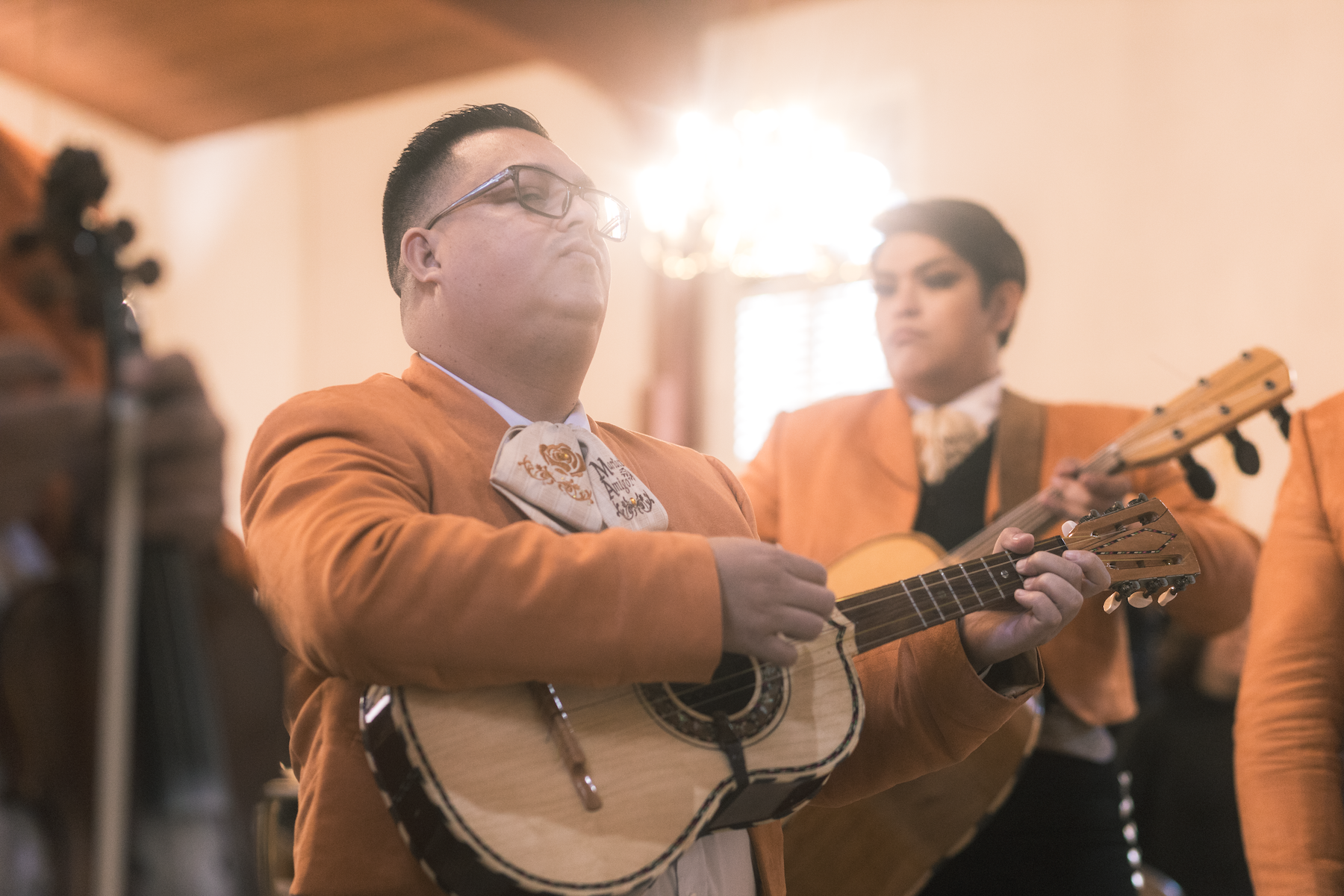
A marachi band from a service honoring Our Lady of Guadalupe.
Morrow is 27 percent Hispanic, according to census data, and St. Augustine leadership recognized an opportunity to invite lapsed Roman Catholic Hispanics who were not interested in the nearby evangelical Hispanic church. “A lot of Hispanics are undocumented, or can’t marry in the Catholic Church or baptize their children,” senior warden and treasurer JoAnn Blackstock recalled. “OK, let’s go for it. We are blessed, thankful, excited and invigorated.”
Those raised Catholic sometimes are surprised that women and LGBTQ+ people can serve as Episcopal priests, and communion is available to all. “Working with Hispanic communities is educating in a new way to visualize the relationship with God,” Guevara said.
Connecting with the Spanish-speaking community takes work. “It’s tough in English, and you have no idea how much harder it is in Spanish,” said Susana Kyle, 77, a vestry member at St. Augustine and a member since 1999, who visits local businesses to spread the word about San Agustin. “You find out that people need help with the language, with poverty, with a lot more needs than they can communicate in English. A lot of times, they don’t know if they’re going to be sent back to the country that they came from. They build a thick skin to protect themselves and they’re not as trusting.”
Born in Cuba, Kyle left Catholicism when she married a cradle Episcopalian. Speaking Spanish, she networks with travel agents, shoppers at the farmer’s markets and the owner of a boutique. She also oversees the church’s food pantry and when Spanish speakers stop by for provisions, she tells them about San Agustin.
“I feel like Paul — I’ve been sent on this quest,” she said. Worshipping in Spanish “can make you feel more at home and less like a stranger.”
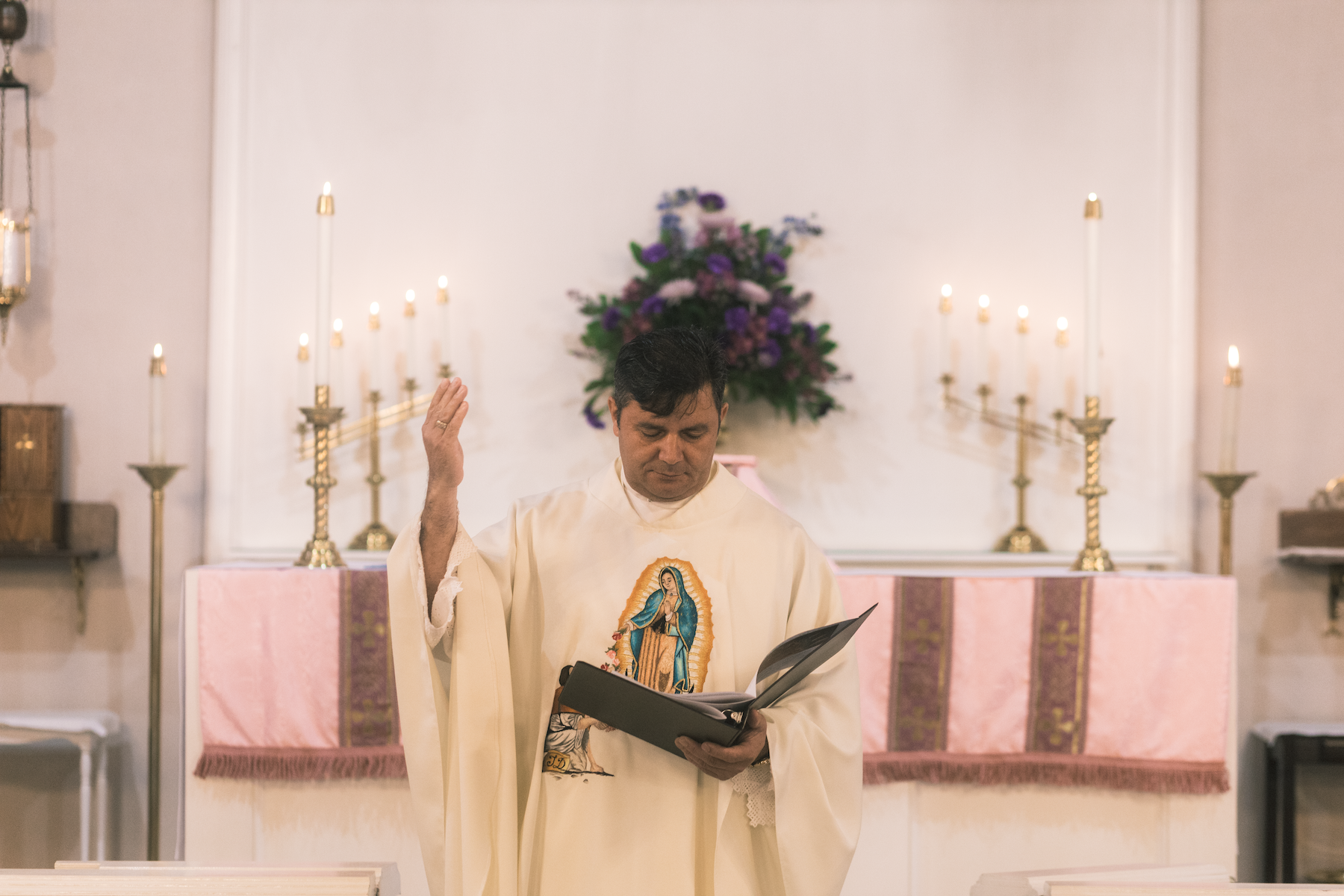
The Rev. Fabio Sotelo preaches to the congregation.
 SAN PABLO, MACON
SAN PABLO, MACON
Starting a Hispanic ministry at St. Paul’s Episcopal Church in Macon made sense because “there was a large Hispanic population in and around Middle Georgia that was being underserved,” said The Rev. Bryan Hinson, rector since 2016. Nearby parishes St. Francis and Christ Church wanted to support this effort too. But St. Paul’s congregation was in a fragile state, and Hinson urged parishioners to take their time.
“We didn’t want to jump into something too early in the recovery of the parish itself,” he added. “And we wanted to make sure that it’s something that the whole parish felt called to.”
Waiting turned into the right timing. St Paul’s connected with Centro Comunitario Hispano (CCH), a local nonprofit that provides services like lessons in English and citizenship. CCH needed a new location, and found room at St. Paul’s. Today, people from Chile, Cuba, Guatemala, Mexico, Peru and Venezuela attend the San Pablo monthly services — which many found out about from seeking services at CCH.
“We try to help them with everything, and the Spanish-speaking Episcopal service makes a complete package,” said Silvia GÓmez, who works at CCH. “With all these programs, the community grows.”
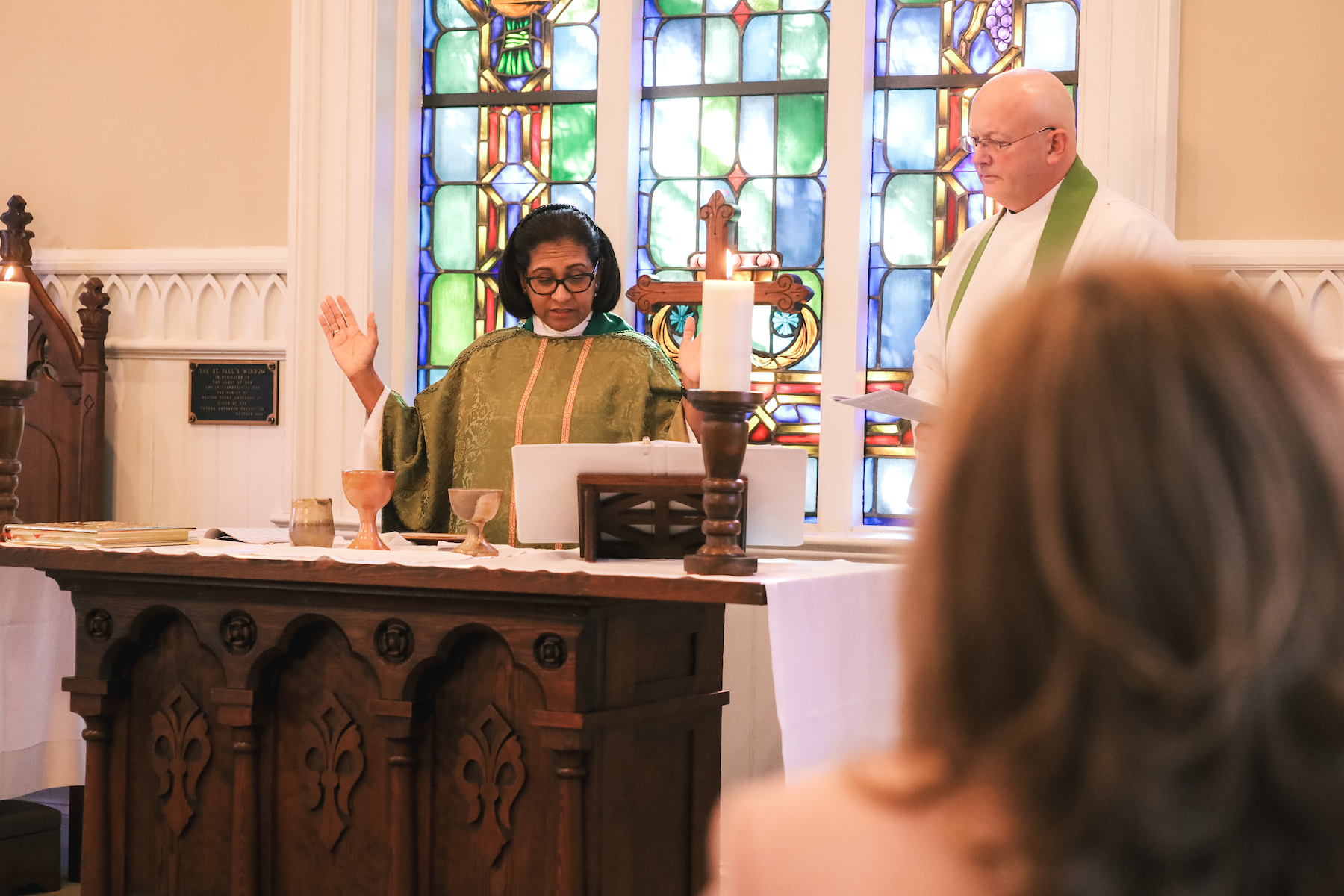
The Rev. Gregoria Betances celebrates the Eucharist at San Pablo.
While Hinson was on sabbatical, bilingual curate The Rev. Andrew Gordon helped launch San Pablo worship services. Speaking Spanish wasn’t as important as listening with compassion to what people said they lacked. “We could say, ‘Look, we can worship in Spanish now,’ and pat ourselves on the back, but creating a space that offers what is most needed in the community takes a lot of listening and discernment,” he said. “It’s a longer process, and it’s been a lot of fun. We’ve created a collaborative atmosphere, grabbing the spirit by the coattails and seeing how we can faithfully step into the newness of a community like this one.”
In the first sermon, he emphasized God’s call to each person, and their trust to follow that call. He personally drew inspiration from what he calls the “radical welcome” he experienced in Honduras as a teacher and coach.
“I can’t replicate that welcome, but I can try to give back in ways that are substantial,” he said. “It’s pledging to come back together to build relationships over cultural, generational or just human differences. Lifting each other up is part of that Jesus example too, of loving our neighbor and loving like Jesus.”
Listen In
In this episode of For People, Bishop Wright has a conversation with The Rev. Mimi Guerra, who shares some of her personal story, the struggles of COVID with our Hispanic congregations, and the need for truly bi-lingual services weekly. Listen in for the full conversation.
